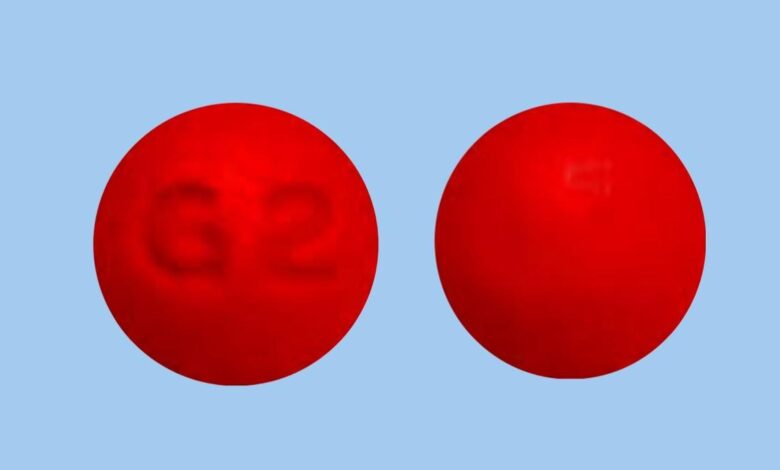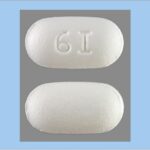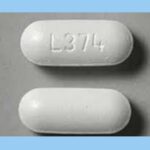What Are Reddish Brown G2 Pills Used For?

The reddish brown, round pill with the imprint G2 has been identified as Ibuprofen 200 mg. It is supplied by Rugby. Ibuprofen is a nonsteroidal anti-inflammatory drug (NSAID). It works by reducing hormones that cause inflammation and pain in the body.
G 2 pill is used to reduce fever and treat pain or inflammation caused by many conditions such as headache, toothache, back pain, arthritis, menstrual cramps, or minor injury.
What should I tell my health care provider before I take this medicine?
They need to know if you have any of these conditions:
• cigarette smoker
• coronary artery bypass graft (CABG) surgery within the past 2 weeks
• drink more than 3 alcohol-containing drinks a day
• heart disease
• high blood pressure
• history of stomach bleeding
• kidney disease
• liver disease
• lung or breathing disease, like asthma
• an unusual or allergic reaction to ibuprofen, aspirin, other NSAIDs, other medicines, foods, dyes, or preservatives
• pregnant or trying to get pregnant
• breast-feeding.
How should I use G 2 pill?
Take this medicine by mouth with a glass of water. Follow the directions on the prescription label. Take this medicine with food if your stomach gets upset. Try to not lie down for at least 10 minutes after you take the medicine. Take your medicine at regular intervals. Do not take your medicine more often than directed.
A special G 2 pill MedGuide will be given to you by the pharmacist with each prescription and refill. Be sure to read this information carefully each time.
Talk to your pediatrician regarding the use of this medicine in children. Special care may be needed.
Overdosage: If you think you have taken too much of this medicine contact a poison control center or emergency room at once.
What if I miss a dose?
If you miss a dose, take it as soon as you can. If it is almost time for your next dose, take only that dose. Do not take double or extra doses.
What may interact with this medicine?
Do not take this medicine with any of the following medications:
• cidofovir
• ketorolac
• methotrexate
• pemetrexed
This medicine may also interact with the following medications:
• alcohol
• aspirin
• diuretics
• lithium
• other drugs for inflammation like prednisone
• warfarin.
This list may not describe all possible interactions. Give your health care provider a list of all the medicines, herbs, non-prescription drugs, or dietary supplements you use. Also tell them if you smoke, drink alcohol, or use illegal drugs. Some items may interact with your medicine.
What should I watch for while using G 2 pill?
Tell your doctor or healthcare provider if your symptoms do not start to get better or if they get worse.
This medicine may cause serious skin reactions. They can happen weeks to months after starting the medicine. Contact your healthcare provider right away if you notice fevers or flu-like symptoms with a rash. The rash may be red or purple and then turn into blisters or peeling of the skin. Or, you might notice a red rash with swelling of the face, lips or lymph nodes in your neck or under your arms.
This medicine does not prevent heart attack or stroke. In fact, this medicine may increase the chance of a heart attack or stroke. The chance may increase with longer use of this medicine and in people who have heart disease. If you take aspirin to prevent heart attack or stroke, talk with your doctor or healthcare provider.
Do not take other medicines that contain aspirin, ibuprofen, or naproxen with this medicine. Side effects such as stomach upset, nausea, or ulcers may be more likely to occur. Many medicines available without a prescription should not be taken with this medicine.
This medicine can cause ulcers and bleeding in the stomach and intestines at any time during treatment. Ulcers and bleeding can happen without warning symptoms and can cause death. To reduce your risk, do not smoke cigarettes or drink alcohol while you are taking this medicine.
You may get drowsy or dizzy. Do not drive, use machinery, or do anything that needs mental alertness until you know how this medicine affects you. Do not stand or sit up quickly, especially if you are an older patient. This reduces the risk of dizzy or fainting spells.
This medicine can cause you to bleed more easily. Try to avoid damage to your teeth and gums when you brush or floss your teeth.
This medicine may be used to treat migraines. If you take migraine medicines for 10 or more days a month, your migraines may get worse. Keep a diary of headache days and medicine use. Contact your healthcare provider if your migraine attacks occur more frequently.
What are the side effects of G 2 pill?
Side effects that you should report to your doctor or health care professional as soon as possible:
• allergic reactions like skin rash, itching or hives, swelling of the face, lips, or tongue
• redness, blistering, peeling or loosening of the skin, including inside the mouth
• severe stomach pain
• signs and symptoms of bleeding such as bloody or black, tarry stools; red or dark-brown urine; spitting up blood or brown material that looks like coffee grounds; red spots on the skin; unusual bruising or bleeding from the eye, gums, or nose
• signs and symptoms of a blood clot such as changes in vision; chest pain; severe, sudden headache; trouble speaking; sudden numbness or weakness of the face, arm, or leg
• unexplained weight gain or swelling
• unusually weak or tired
• yellowing of eyes or skin
Side effects that usually do not require medical attention (report to your doctor or health care professional if they continue or are bothersome):
• bruising
• diarrhea
• dizziness, drowsiness
• headache
• nausea, vomiting.
This list may not describe all possible side effects. Call your doctor for medical advice about side effects. You may report side effects to FDA at 1-800-FDA-1088.
Where should I keep my medicine?
Keep out of the reach of children. Store at room temperature between 15 and 30 degrees C (59 and 86 degrees F). Keep container tightly closed. Throw away any unused medicine after the expiration date.





